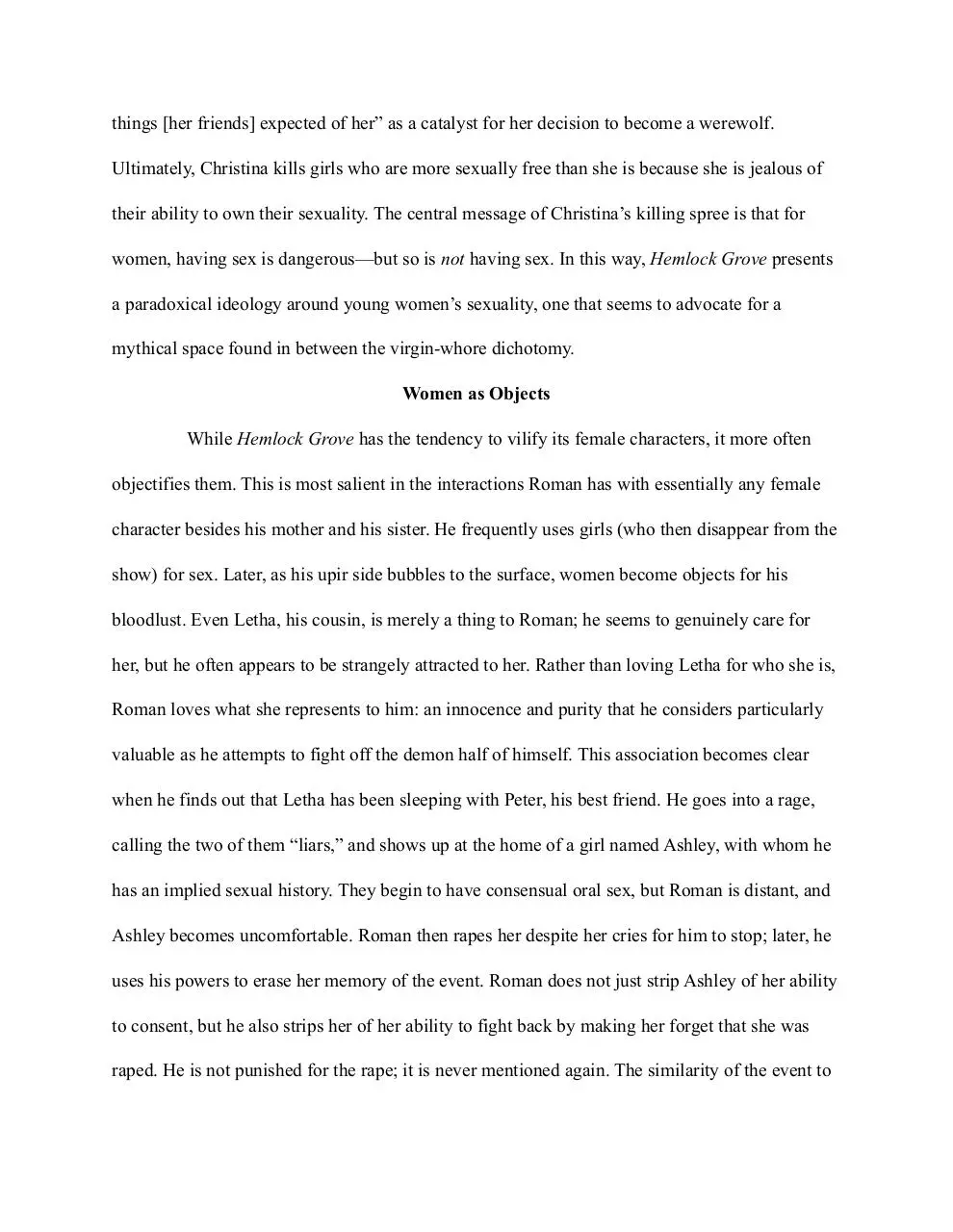Netflix Excerpt (PDF)
File information
Title: Netflix Excerpt
This PDF 1.3 document has been generated by Pages / Mac OS X 10.10.3 Quartz PDFContext, and has been sent on pdf-archive.com on 18/09/2015 at 05:33, from IP address 129.10.x.x.
The current document download page has been viewed 707 times.
File size: 88.07 KB (7 pages).
Privacy: public file





File preview
Abstract
Netflix is a multibillion dollar media streaming service and DVD-by-mail distributor with global
reach and over 60 million subscribers as of January 2015. As of 2013, Netflix has been
producing and distributing its own series, some of which have achieved both critical and
commercial success. In an effort to determine Netflix’s particular attribution to female
representation in its original series, I examine three of their most popular programs: House of
Cards, Hemlock Grove, and Orange Is the New Black. I find that these series present genderrelated ideological tensions, at once embracing and rejecting certain aspects of feminism. While
House of Cards and Orange Is the New Black make strides in women’s representation on
television (primarily by addressing female-specific struggles and subverting dominant ideas of
femininity), they also introduce problematic depictions of femaleness in American society.
Meanwhile, Hemlock Grove remains ideologically sexist, reducing its women to tired stereotypes
and sexual objects. Ultimately, while Hemlock Grove represents a step back in terms of female
representation, the feminist readings of House of Cards and Orange Is the New Black signify a
notable move forward in female representation on television despite the series’ ideological
tensions.
Keywords: Gender, ideology, Netflix, women, House of Cards, Orange Is the New
Black, Hemlock Grove
Excerpt (pg. 16-21)
Hemlock Grove
Hemlock Grove is a horror-mystery series that follows two supernatural teenage boys,
Roman Godfrey and Peter Rumancek, living in Pennsylvania (their fictional town is the series’
namesake). The series features numerous female characters, but their roles are steeped in sexism,
even misogyny, and many of them serve little purpose beyond sexual gratification. While there
are a handful of strong female characters, most of them are problematic. The first season features
two genuinely powerful women, one of whom is dead before she is able to truly exercise her
power, and the other of whom embodies a handful of stereotypically feminine characteristics
while also maintaining a truly evil persona. Furthermore, the series continually objectifies its
women and suggests that female sexuality is dangerous. Ultimately, feminist-minded depictions
of women are few and far between, with most female characters on Hemlock Grove being
reduced to objects or tired stereotypes.
Female Power
There are few truly powerful female characters throughout the first two seasons of
Hemlock Grove. Ironically, Shelley, whose name is a not-so-subtle nod to the author of
Frankenstein, is not one of them, despite her resemblance to the canonical monster. It is implied
that Shelley was reanimated from a corpse when she was a baby; she is massive, missing an eye,
and, although clearly intelligent, does not or cannot speak until the second season. She is fettered
by her physical appearance and her disability; instead of rising above these challenges, she is an
outcast, and she is often bullied by her mother and her classmates. The show cannot seem to
reconcile a physically unattractive woman with an autonomous and confident one. Instead,
strong female characters must also exude feminine beauty.
One of these characters is Clementine, a doctor, former marine, and member of the
Order of the Dragon, a Christian organization dedicated to hunting and killing supernatural
creatures. Clementine is intelligent, strong, and passionate about her faith. She is often depicted
wrestling with guilt about the things she has done in the name of the Order (like killing a
pregnant werewolf whom she had befriended), but, as she says, “God doesn’t want you to be
happy; he wants you to be strong.” She comes to Hemlock Grove under the guise of
investigating a series of murders (though her true motive is to kill the supernatural creatures in
town), but she is killed by Olivia, the show’s only other strong female, before she is able to carry
out any of her plans. Her death becomes an incentive for her brother—the true opponent for
Hemlock Grove’s supernatural community, it seems—to come to Hemlock Grove in the second
season.
The aforementioned Olivia, another powerful woman on Hemlock Grove, is incredibly
problematic as an embodiment of female strength. She is Roman’s mother, and despite her
motherly love, the show depicts her as antagonistic towards him (she wants him to abandon his
humanity and claim his identity as an upir, a sort of pseudo-vampire). While she is cunning,
strong, and in control of almost everything and everyone around her, she is marked by three
stereotypically feminine qualities: sleeping her way to the top, vanity, and a fierce but
specifically directed maternal instinct. Olivia married into her wealth, which she flaunts, and
then drove her husband to his suicide while maintaining an affair with his brother. Ultimately, the
show frames her as a “gold-digger” type, a woman with a history of seducing men for her own
personal gain. Furthermore, as an immortal, she is used to a youthful beauty that she seems to
cherish. In the second season, after being quasi-murdered and brought back to life, she finally
begins to age, which devastates her. But her biggest feminine weakness is her obsession with her
son, which occasionally borders on erotic. While she does not seem to care much for Shelley, she
is incapable of leaving Roman alone, smothering him with her affection and attempting to
manage his decisions (she literally hypnotizes him on several occasions). After Olivia
manipulates Roman into become an upir like herself, he bites off her tongue and delivers a line
that seems to sum up the way the show feels about its stronger women: “You talk too much.”
Female Sexuality as Dangerous
The pivotal mystery of the first season of Hemlock Grove is a series of murders that are
occurring throughout the town. All of the victims are women, and all of them are viciously
mutilated by what seems to be a large wolf. It is later revealed that the creature behind the attacks
is a vargulf, or a “rogue” werewolf. The vargulf targets pretty, flirty teenagers, and a witness
claims to have seen the creature “go for [one of the victim’s] lady part first.” This implies a direct
assault on female sex and sexuality, which is later confirmed when the vargulf is revealed to be a
lonely teenage girl named Christina whose mental state has been steadily declining. Christina
confesses that she has been purposely targeting girls she considers to be promiscuous, including
her best friends, twin sisters whom she refers to as “those fucking cunts” and whose “dirty little
stories” seem to have maddened Christina. This narrative—young girls getting murdered for their
supposed promiscuity—is a genre staple, but that does not make its implications any less sexist.
Christina herself is shown as somewhat sexually repressed, which is suggested to be one of her
principal motives. Her friends refer to her as “the biggest prude in school” and she cites “all the
things [her friends] expected of her” as a catalyst for her decision to become a werewolf.
Ultimately, Christina kills girls who are more sexually free than she is because she is jealous of
their ability to own their sexuality. The central message of Christina’s killing spree is that for
women, having sex is dangerous—but so is not having sex. In this way, Hemlock Grove presents
a paradoxical ideology around young women’s sexuality, one that seems to advocate for a
mythical space found in between the virgin-whore dichotomy.
Women as Objects
While Hemlock Grove has the tendency to vilify its female characters, it more often
objectifies them. This is most salient in the interactions Roman has with essentially any female
character besides his mother and his sister. He frequently uses girls (who then disappear from the
show) for sex. Later, as his upir side bubbles to the surface, women become objects for his
bloodlust. Even Letha, his cousin, is merely a thing to Roman; he seems to genuinely care for
her, but he often appears to be strangely attracted to her. Rather than loving Letha for who she is,
Roman loves what she represents to him: an innocence and purity that he considers particularly
valuable as he attempts to fight off the demon half of himself. This association becomes clear
when he finds out that Letha has been sleeping with Peter, his best friend. He goes into a rage,
calling the two of them “liars,” and shows up at the home of a girl named Ashley, with whom he
has an implied sexual history. They begin to have consensual oral sex, but Roman is distant, and
Ashley becomes uncomfortable. Roman then rapes her despite her cries for him to stop; later, he
uses his powers to erase her memory of the event. Roman does not just strip Ashley of her ability
to consent, but he also strips her of her ability to fight back by making her forget that she was
raped. He is not punished for the rape; it is never mentioned again. The similarity of the event to
an instance of date rape is particularly striking, and it solidifies Roman’s status as a character
who sees women as vessels rather than people. While featuring a sexist character is certainly not
evidence of a show’s underlying sexism, the fact that Roman is the show’s chief protagonist
makes these depictions incredibly problematic. He is continually depicted as a sympathetic
character, one who should be forgiven for his sexism because he cannot help it. By endorsing
Roman as essentially well-intentioned despite his treatment of women, Hemlock Grove also
endorses a culture of female objectification.
Hemlock Grove’s objectification runs deeper than Roman’s sexism. One of the lead
characters of the second season, Miranda, epitomizes the way that the show uses its women.
After showing up at Roman’s doorstep after a car accident, Miranda essentially becomes a
replacement for Letha, who dies in childbirth at the end of the first season (she was impregnated
in her sleep by a hypnotized Roman, something she never seems to figure out, which presents its
own set of problems). Whereas in the first season Roman and Peter engage in an unspoken but
noticeable battle over which of them Letha “belongs” to, Roman and Peter physically fight over
Miranda after they both sleep with her at separate times. Not to be deterred by this, Miranda
offers herself to both of them at once, and the three of them begin a polyamorous quasirelationship. Meanwhile, Miranda has become a surrogate mother to Roman and Letha’s child;
she begins lactating in the baby’s presence, and seems unperturbed enough by this to nurse the
baby on multiple occasions. Later, it is revealed that her car accident near Roman’s house was
arranged; her entire situation was manipulated (by another man) so that she could breastfeed
Roman’s child. Ultimately, Miranda’s only utility is serving as a romantic interest to Roman and
Peter and nursing Roman’s baby. In this way, Hemlock Grove resorts to the clichéd, sexist idea
that women are good for two things: sex and child-rearing.
Download Netflix Excerpt
Netflix Excerpt.pdf (PDF, 88.07 KB)
Download PDF
Share this file on social networks
Link to this page
Permanent link
Use the permanent link to the download page to share your document on Facebook, Twitter, LinkedIn, or directly with a contact by e-Mail, Messenger, Whatsapp, Line..
Short link
Use the short link to share your document on Twitter or by text message (SMS)
HTML Code
Copy the following HTML code to share your document on a Website or Blog
QR Code to this page

This file has been shared publicly by a user of PDF Archive.
Document ID: 0000301924.